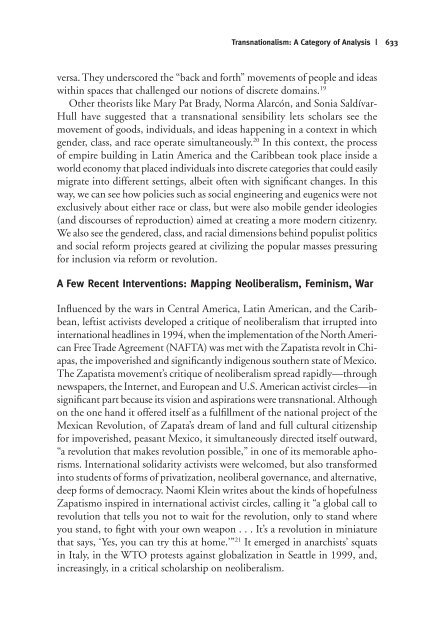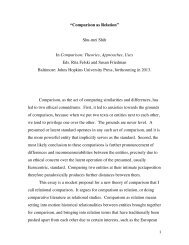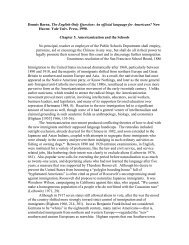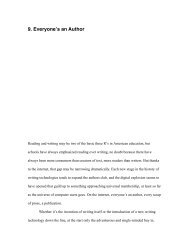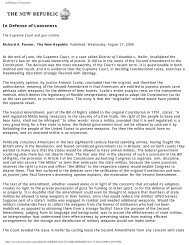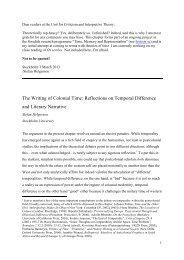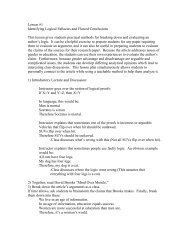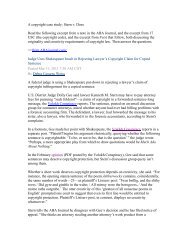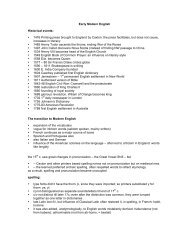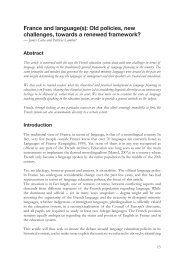Transnationalism: A Category of Analysis - Unit for Criticism and ...
Transnationalism: A Category of Analysis - Unit for Criticism and ...
Transnationalism: A Category of Analysis - Unit for Criticism and ...
Create successful ePaper yourself
Turn your PDF publications into a flip-book with our unique Google optimized e-Paper software.
<strong>Transnationalism</strong>: A <strong>Category</strong> <strong>of</strong> <strong>Analysis</strong> | 633<br />
versa. They underscored the “back <strong>and</strong> <strong>for</strong>th” movements <strong>of</strong> people <strong>and</strong> ideas<br />
within spaces that challenged our notions <strong>of</strong> discrete domains. 19<br />
Other theorists like Mary Pat Brady, Norma Alarcón, <strong>and</strong> Sonia Saldívar-<br />
Hull have suggested that a transnational sensibility lets scholars see the<br />
movement <strong>of</strong> goods, individuals, <strong>and</strong> ideas happening in a context in which<br />
gender, class, <strong>and</strong> race operate simultaneously. 20 In this context, the process<br />
<strong>of</strong> empire building in Latin America <strong>and</strong> the Caribbean took place inside a<br />
world economy that placed individuals into discrete categories that could easily<br />
migrate into different settings, albeit <strong>of</strong>ten with significant changes. In this<br />
way, we can see how policies such as social engineering <strong>and</strong> eugenics were not<br />
exclusively about either race or class, but were also mobile gender ideologies<br />
(<strong>and</strong> discourses <strong>of</strong> reproduction) aimed at creating a more modern citizenry.<br />
We also see the gendered, class, <strong>and</strong> racial dimensions behind populist politics<br />
<strong>and</strong> social re<strong>for</strong>m projects geared at civilizing the popular masses pressuring<br />
<strong>for</strong> inclusion via re<strong>for</strong>m or revolution.<br />
A Few Recent Interventions: Mapping Neoliberalism, Feminism, War<br />
Influenced by the wars in Central America, Latin American, <strong>and</strong> the Caribbean,<br />
leftist activists developed a critique <strong>of</strong> neoliberalism that irrupted into<br />
international headlines in 1994, when the implementation <strong>of</strong> the North American<br />
Free Trade Agreement (NAFTA) was met with the Zapatista revolt in Chiapas,<br />
the impoverished <strong>and</strong> significantly indigenous southern state <strong>of</strong> Mexico.<br />
The Zapatista movement’s critique <strong>of</strong> neoliberalism spread rapidly—through<br />
newspapers, the Internet, <strong>and</strong> European <strong>and</strong> U.S. American activist circles—in<br />
significant part because its vision <strong>and</strong> aspirations were transnational. Although<br />
on the one h<strong>and</strong> it <strong>of</strong>fered itself as a fulfillment <strong>of</strong> the national project <strong>of</strong> the<br />
Mexican Revolution, <strong>of</strong> Zapata’s dream <strong>of</strong> l<strong>and</strong> <strong>and</strong> full cultural citizenship<br />
<strong>for</strong> impoverished, peasant Mexico, it simultaneously directed itself outward,<br />
“a revolution that makes revolution possible,” in one <strong>of</strong> its memorable aphorisms.<br />
International solidarity activists were welcomed, but also trans<strong>for</strong>med<br />
into students <strong>of</strong> <strong>for</strong>ms <strong>of</strong> privatization, neoliberal governance, <strong>and</strong> alternative,<br />
deep <strong>for</strong>ms <strong>of</strong> democracy. Naomi Klein writes about the kinds <strong>of</strong> hopefulness<br />
Zapatismo inspired in international activist circles, calling it “a global call to<br />
revolution that tells you not to wait <strong>for</strong> the revolution, only to st<strong>and</strong> where<br />
you st<strong>and</strong>, to fight with your own weapon . . . It’s a revolution in miniature<br />
that says, ‘Yes, you can try this at home.’” 21 It emerged in anarchists’ squats<br />
in Italy, in the WTO protests against globalization in Seattle in 1999, <strong>and</strong>,<br />
increasingly, in a critical scholarship on neoliberalism.


